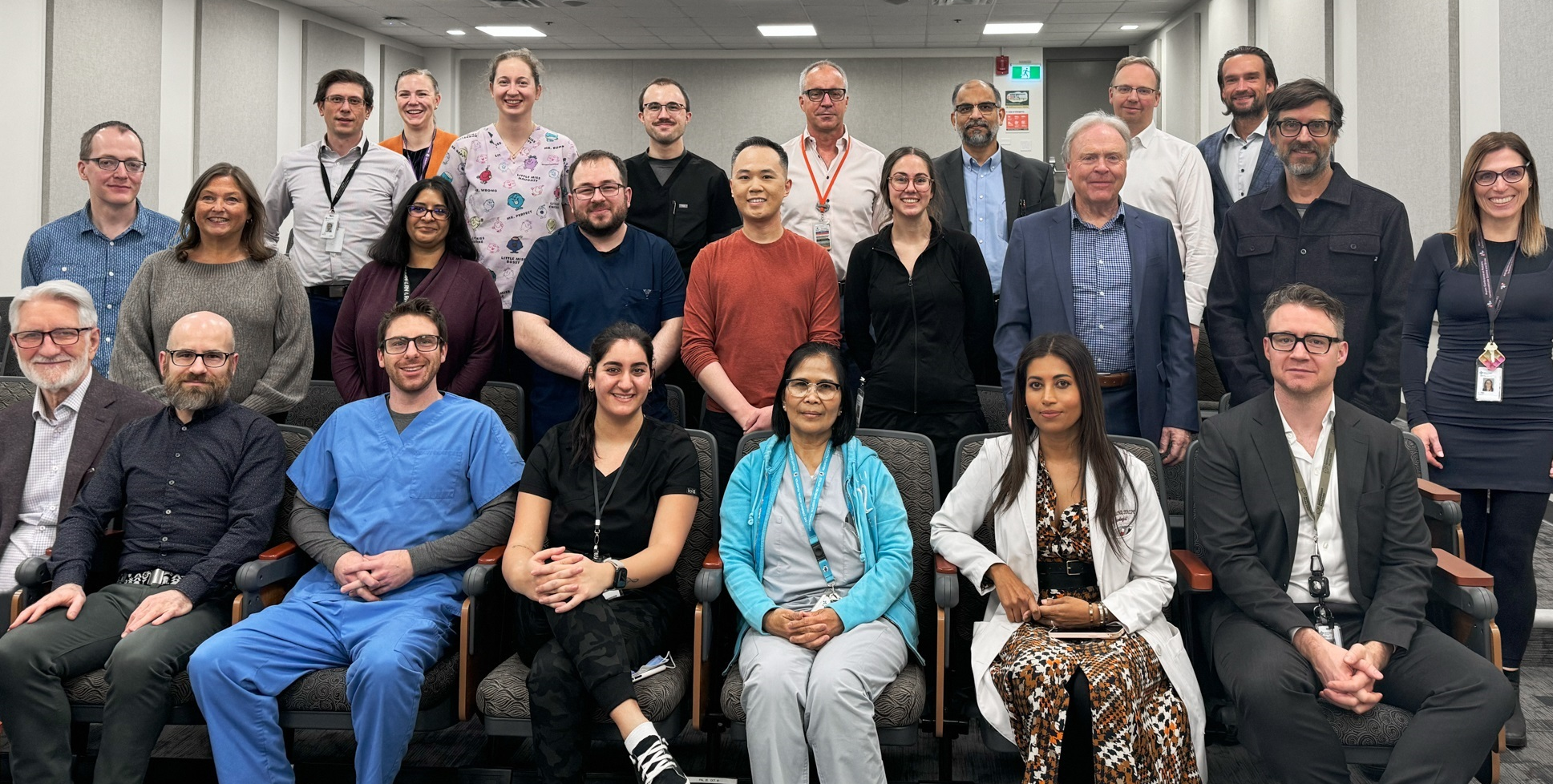Neurology
What is Pediatric Neurology?
Pediatric neurology is a branch of medicine concerned with treating disorders of the nervous system in children and includes all conditions involving the brain, spinal cord, muscle and nerves.
Pediatric neurologists diagnose and manage a wide range of nervous system disorders in children, including:
- seizures and epilepsy
- stroke
- nerve and muscle diseases
- brain malformations
- neonatal brain injury
- headaches and migraine
- neurogenetic disorders
- neurometabolic and degenerative brain disorders
- movement disorder
- neurocutaneous syndromes
- neuroinflammatory disorders

Pediatric neurology clinics are primarily based at the Stollery Children's Hospital, with a number of clinics and interactions occurring also at the Glenrose Rehabilitation Hospital.
About the Division
We have developed a national and international reputation in the field of neonatal brain injury and continue to actively investigate new ways of identifying and treating the compromised newborn brain. Our division has strong national and international collaborations with neuromuscular disease experts throughout the world with membership in the Canadian Pediatric Neuromuscular Group and the Co-operative International Neuromuscular Research Group (CINRG). This is a worldwide consortium of medical and scientific researchers whose goal is to discover effective treatments for muscle diseases. We are also collaborating nationally and internationally with different research groups on neurogenetic and neurometabolic degenerative conditions.
Recent surgical advances in epilepsy at the Stollery Children's Hospital have brought national and international recognition. Advances include epilepsy surgery in infants, the use of implanted depth electrodes for surgical mapping, intra-operative computer guidance systems, the use of 3D electrical dipole models and the use of new neuro-imaging systems for brain mapping and for identification of the epileptic zone.
Associated Programs
- Established in 1988, our Comprehensive Epilepsy Program (CEP) was Canada's first comprehensive centre for epileptic adults and children. CEP includes in-patient epilepsy monitoring units, epilepsy out-patient clinics and a large neuropsychology/ electroencephalography (EEG) laboratory.CEP is made up of a large multi-disciplinary team including those from neurology, neurosurgery, neuropsychology, neurosciences, nursing, psychiatry, physiotherapy, occupational therapy, and EEG technicians.As part of CEP, our centre offers the Ketogenic Diet Program. The program is unique as it has a dedicated epileptologist, clinical nurse practitioner and dietitian.

Clinical Care
Outpatient or ambulatory clinics, focusing on disorders of the brain in children, are held throughout the week as a referral based service.
Current clinics include:
We offer the Comprehensive Epilepsy Program, Canada's first comprehensive treatment centre for epileptic adults and children.
The program offers patients expertise of a team of specialized physicians, surgeons, nurses, technologists and therapists in the areas of neurology, neurosurgery, neuropsychology, neuropsychiatry, pediatrics, physiotherapy and occupational therapy.
The pediatric portion of the program assesses an average of 1,000 children per year. These children are seen in weekly epilepsy clinics as outpatients or inpatients in the Stollery's Pediatric Epilepsy Monitoring Unit. The program helps pediatric patients control their seizures through medications, vagal nerve stimulators (implanted electrodes) or surgical intervention. The Comprehensive Epilepsy program has provided epilepsy care of children across Alberta and Canada for over 25 years.
We have established a Neurogenetics Clinic at the Glenrose Rehabilitation Hospital that offers a consultation service in neurogenetics of intellectual disability. Intellectual disability affects three percent of the population and patients require complex care. The clinic collaborates with developmental pediatric and physical medicine programs very actively to provide comprehensive care to the patients with ID.
We recently established a multidisciplinary Fragile X Clinic, which is affiliated with the National Fragile X Association. Fragile X syndrome is the most common cause of intellectual disability. At this clinic, patients with Fragile X and their family have access to our pediatric neurologists and nurses. Also, through collaboration with the Genetics department, patients and families are assisted with genetic counseling and investigation of family members when necessary.
We have one of the first child and adolescent specific autonomic laboratories in Canada. Children and adolescents with autonomic dysfunction may have any number of signs or symptoms including fainting, dizziness, fatigue, heat or cold intolerance, constipation, and fluctuations in body temperature.
Our laboratory uses a battery of standardized tests to help characterize the function of the autonomic nervous system which controls many of the systems in the body including heart rate, blood pressure, sweating, temperature, and the movement of the bowels. Testing may lead to a diagnosis of conditions like Postural Orthostatic Tachycardia Syndrome (POTS), neurocardiogenic syncope, or may simply help identify areas of autonomic dysfunction as part of another medical condition such as Congenital Central Hypoventilation Syndrome.
Research
Current areas of study include:
- Pediatric Epilepsy
- The Comprehensive Epilepsy Program (CEP) is involved in clinical trials for new anti-epileptic drugs and epilepsy treatments. CEP is a leader in pediatric epilepsy surgery in Canada. The long-term outcomes of epilepsy surgery are currently being investigated, and early results provide evidence to support early operation. The CEP team has published extensively on the surgical procedures and outcomes in children undergoing epilepsy surgery.
- Neurogenetics
- This highly translational program involves research from bench to bedside with human and animal models. The program is focused on gaining an understanding of the molecular basis of intellectual disability (ID) and autism. This is essential to developing treatments in animal models that could later be translated into clinical trials with the aim of improving the quality of life of our patients with ID and autism.
- The human genomic research program uses cutting-edge methods such as comparative genomic hybridization and whole exome sequencing to uncover the genes causing ID and autism. Several new genes have already been identified and published.
- In addition, we are part of clinical trials and have established several patients registries (for Fragile X and ID) in order to include patients in clinical research. To better understand the molecular pathways and test potential treatments, we use various models including a well-established test for learning and memory in the fruit fly drosophila. Students and fellows are therefore exposed to a full spectrum of basic and clinical research.
- Neuromuscular Disease
- We are actively involved in the Co-operative International Neuromuscular Research Group (CINRG). Headquartered in Washington D.C., this productive research network has partners from 27 countries including the United States, United Kingdom, Australia, India, Italy, Belgium, Argentina and Japan. In addition, there has been collaborative work recently completed with Australian genetic researchers in the area of congenital myopathies.
- Pediatric Stroke
- The Pediatric Stroke Program is part of an international group of researchers, investigating the underlying causes and routes to prevention, treatment and management of newborns and children with stroke. Expansion of this program is ongoing, inclusive of new therapies in pediatric rehabilitation and initiatives to evaluate outcomes and response to therapy and causes of stroke.
Education
Division Members
Divisional Director
Academic Members
Francois Bolduc
Janani Kassiri
Hanna Kolski
Natarie Liu
Janette Mailo
Thilinie Rajapakse
Lawrence Richer
Ratika Srivastava
Barry Sinclair
Colin Wilbur
Jerome Yager
Clinical Members